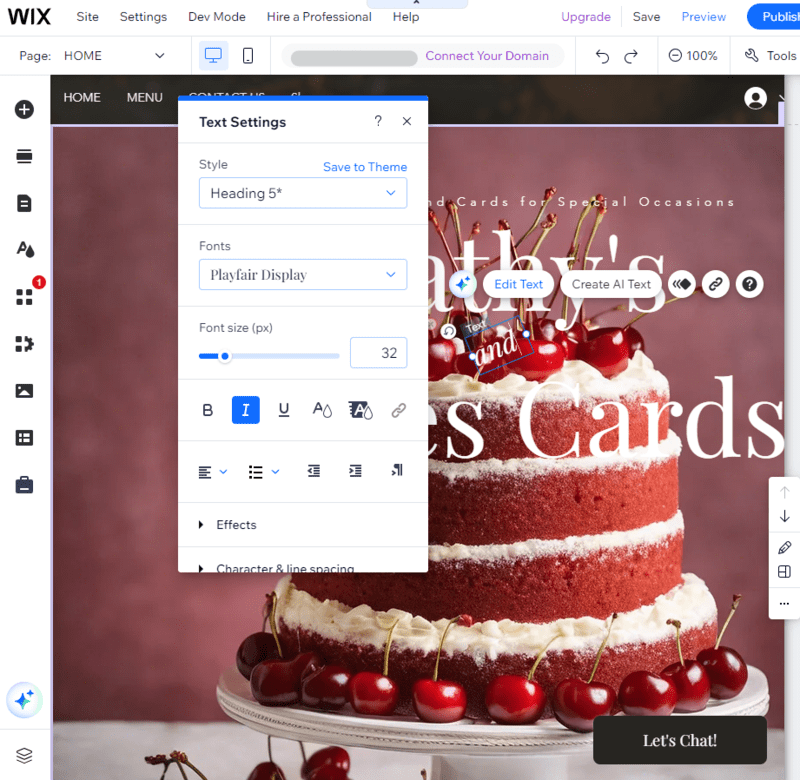The best website builder for most users is Wix. The popular website builder features over 1,000 customizable templates, an advanced AI chatbot builder that is easily fine-tuned, and offers the most useful customer support center out of every builder we tested. Simply put, Wix is a safe bet for beginners and experienced users alike.
If you’re looking for an ultra-low learning curve, Squarespace is the easiest website builder for beginners to get started with. The design-focused builder also offers a huge range of excellent templates and a highly responsive drag-and-drop editor, which means it’s pretty easy to create a professional-looking website.
Whether you’re a business with a penchant for design, or an ecommerce vendor looking to sell big, we’ve rounded up the best website builders on the market based on our in-depth research and testing of each platform. In this guide, we outline their price points, as well as what they’re best for, before diving into more detail.
Key Takeaways
- Wix is the best all-in-one website builder, because of its extensive set of features and affordable entry-level plan.
- Another top choice is Squarespace, which is best for beginners and creatives, offering the easiest-to-use platform through an intuitive and user-friendly interface.
- For a budget option, businesses should check out Hostinger, with introductory plans starting as low as $1.95 per month if you make the most of current deals.
- Ecommerce businesses would do well to go for Shopify for its top-tier sales features, but they may be put off by the expensive prices.
- When choosing the right website builder for your business, you should focus on the main purpose of your site, your budget, and how much experience you already have using these platforms.
What Is the Best Website Builder?
Here’s a breakdown of all the best website builders. Click the links for in-depth reviews and pricing information for each website builder.
- Wix – Best overall website builder
- Squarespace – Easiest website builder to use
- Shopify – Best for ecommerce success
- GoDaddy – Best for getting set up quickly
- Hostinger – Cheapest starter plan
| Starting price | Free plan | Templates How many templates are available? | Rating Overall score based on features, value, support, ease of use, and customer score | ||
|---|---|---|---|---|---|
|
| |||||
| | | | | | |
| 2,000+ | 180+ | 800+ | 20 | 150+ | |
| 4.8 | 4.6 | 4.4 | 4.1 | 4.1 |
Scroll down to find the best website builder for your particular needs or skip straight to our website builder comparison page to weigh up the top solutions at a glance. Prices are accurate as of Fall 2025.
Test Summary 2025
Wix has an impressive array of features that will lend themselves to almost every business specialism. For instance, if you’re a dentist, the builder’s industry-specific themes recommend relevant services you can add to your website and it even has pictures of dentist surgeries in its stock image bank.
However, if you’re looking for a modern alternative, I was really impressed with how uncluttered Squarespace’s interface was, and how easy it was to navigate. For instance, it was really easy to add products to my ecommerce site and edit them to suit my liking.
I’d be wary about using Squarespace’s AI site builder though, as I found it made my website look quite generic and similar to a lot of websites that are already out there.
When I used Shopify, I was impressed with how many customization options the platform offered. While these features may get lost on smaller businesses with simpler site needs, I can see it being really useful for large ecommerce stores that use the builder to handle multiple processing like online ordering, shipping, and fulfillment.
GoDaddy, on the other hand, offered much less scope for customization, but its fuss-free functionality will probably lend itself well to users building a starter website.

1. Wix
- Best overall website builder
- Pricing from: $17 per month
Wix is an all-in-one website builder that excels in most major areas. From frontend design options to digital marketing, the software offers every feature you need to build a successful site. In fact, Wix had the most website features in our research by a wide margin, beating out Squarespace and Shopify for the top spot.
Check out our Wix review for more information

Pros
- Unrivaled selection of website features across design, sales, and support
- AI features can create a site in 60 seconds
- Quality free forever plan available
Cons
- No template switching once published
- Number of features can be overwhelming for some beginners
- Steep price increase for scaling businesses
- Light: $17/month

- Core: $29/month

- Business: $39/month

- Business Elite: $159/month

- 10% off any plan with code TAKE10

- 14-day free trial available

What are Wix’s key features?
Wix has an outstanding array of features that give you maximum control over your website and your end-user experience. From SEO and marketing to blogging and booking, Wix’s vast feature catalog makes it ideal for businesses with advanced site needs – that don’t want to invest tons of money into hiring a professional. We’re big fans of Wix, here at Tech.co.
Wix has over 2,000 templates to choose from, making it perfect for businesses that don’t want to waste time getting started. Combine this with the platform’s intuitive drag-and-drop editor, and businesses should have no doubt that this builder is capable of creating a stand-out site.

Wix lets me edit the content, color, and style of the text on my website, and move it wherever I want on the page. Source: Tech.co testing
Even better, if your site needs are more complex or specific, you have access to Wix’s over 800 strong App Market, allowing you to seamlessly integrate the product with a range of free or paid add-ons — from ecommerce to design, and everything in between.
While we certainly enjoyed the impressive functionality of Wix, we did also record some slower loading times as a result, which is something for users to keep in mind if they are looking to build a website in a rush.

The Wix App Market provided plenty of third-party integrations to help build out our site. Source: Tech.co testing
By and large, we found Wix intuitive and easy to use, thanks to its simple drag-and-drop editor and excellent range of help and support options across a wide range of channels, including phone, live chat, and knowledge center.
However, the sheer number of options at your disposal does mean that it can get confusing. We’ve definitely got a couple of concerns with the dashboard, which comes across a little crowded. In particular, we ran into difficulty while trying to navigate to Wix’s SEO features.
What’s more, when one of our writers made a mock website using the builder, they said they felt like it would have taken them hours to familiarize themselves with the full feature catalog if they were to continue to build out the site. That being said, Wix’s vast offering means that once you do get the hang of the site, there’s very little you can’t do.
However, Wix’s step-by-step guide helped us get to grips with the platform quite quickly. Plus, if you don’t want to follow manual steps, Wix AI features also help to make the web-building process a bit easier for the uninitiated. Most notably, Wix’s AI builder got us started with a website after just a few short questions.

Like today’s AI chatbots, we just had a simple conversation with Wix’s AI builder about what we wanted on our website. Source: Tech.co testing
What's New With Wix in 2025?
In May, Wix launched an AI visual design platform, Wixel, that allows users to create unique pages for their site, including editing existing photos and generating new designs.
Is Wix good value for money?
Wix offers four main plans: Light ($17 per month), Core ($29 per month), Business ($39 per month), and Business Elite ($159 per month).
While the builder’s monthly packages aren’t as cheap as GoDaddy or Squarespace, you do get more for your money, justifying its slightly larger price tag.
If your business can do without the bells and whistles offered in its premium packages, you’re also able to make a website for free with Wix’s free plan. However, you won’t be able to create a custom domain with this tier, so it won’t be for everyone.
Check out our guide to Wix pricing for more information
| Plan | Price paid annually The price per month you'll pay if you choose to be billed annually | Bandwidth | Storage | Ecommerce | Support | |
|---|---|---|---|---|---|---|
| 3GB | Unlimited | Unlimited | Unlimited | |||
| 2GB | 50GB | 100GB | Unlimited | |||
| | | | | |||
| 24/7 | 24/7 | 24/7 | Priority |
2. Squarespace
- Best for seamless user experience
- Pricing from: $16 per month
Squarespace is another website builder that’s strong across the board. In fact, during our research, Squarespace only marginally missed out on the top position, falling just short of Wix due to its smaller feature catalog and limited help and support options in comparison.
Our users loved the process of using Squarespace, which is why we have rated it best for user experience. In particular, our users highlighted its intuitive interface, with functions such as adding a logo to a page being described and “nice” and “simple”. Likewise, another user said the platform made the process of designing the site “so enjoyable”.

Pros
- Easiest website builder to use across our research
- Plenty of content-focused features for blogging
- Integrates with Acuity for booking and appointments
Cons
- Limited language support for international businesses
- AI site builder creates fairly generic output
- Performed poorly on-site speed tests in our research
- Basic: $16/month

- Core: $23/month

- Plus: $39/month

- Advanced: $99/month

- 10% off with code TC10

- 14-day free trial

What are Squarespace’s key features?
While the platform doesn’t offer as many templates as Wix, every one of Squarespace’s 187 (and counting) options is completely customizable and has been crafted by professional designers. This means that sites are easy to build, design, and edit, and it’s virtually impossible to make the end result look bad.
Check out our Squarespace review for more information

Squarespace let me filter its professionally designed templates by topic and business type. Source: Tech.co user testing
Where Squarespace really excelled was in its design capabilities. Its AI website builder has significantly improved since our previous round of user testing. This time around, our researchers noted that the builder had a “sleek” design and improved customization options, as well as clear step-by-step guidance to hold the users’ hand throughout the process.
The team did note some concerns with the builder’s AI text generation capabilities, but this is pretty common across the industry. Additionally, while Squarespace excels in aesthetics and usability, the software itself is slightly less customizable than Wix, and site speeds can run a little slower than competitors like GoDaddy due to its weighty designs.
Check out our guide to Wix versus Squarespace for a full comparison

Squarespace’s Fluid Engine editor made adding content easy for our team. Source: Tech.co user testing
What's New With Squarespace in 2025?
- As of October, Squarespace now offers the option to upload and use your own custom font, giving businesses the opportunity to make their website stand out further.
- Your customers can now pay through a Pay Link, where Squarespace will direct them to a checkout page to finish their transaction.
Is Squarespace good value for money?
Squarespace offers four web-building packages, Basic ($16 per month), Core ($23 per month), Plus ($39 per month), and Advanced ($99 per month).
Squarespace pricing is pretty good, but it can’t compete with the likes of Wix, Hostinger, or GoDaddy, which all scored higher than Squarespace in terms of value during our latest round of testing. For a full breakdown of each plan, check out the pricing table below.
| Plan | Price from | Staff accounts | Transaction fees | ||
|---|---|---|---|---|---|
| 2 | Unlimited | Unlimited | Unlimited | ||
| 2% | 0% | 0% | 0% | ||
| See Pricing | See Pricing | See Pricing | See Pricing |
3. Shopify
- Best for building a complex online store
- Pricing from: $5 per month
Shopify is a powerful website builder, but it really shines when it comes to ecommerce. With a range of sales tools under its belt, from wholesale channels to advanced inventory management, Shopify should be your top pick if you’re looking to build a strong ecommerce site. In fact, our research suggests it’s the best ecommerce web builder on the market right now.
Scalability is another big plus for Shopify, particularly compared with top competitor Wix in the ecommerce space. For one, Shopify allows for unlimited products even on its cheapest plan, while Wix only allows for up to 50,000 products no matter which plan you go for, so enterprise businesses might have trouble with larger inventories.

Pros
- Vast selection of third-party integrations and apps
- Range of customer support including phone, live chat, and 24/7 options
- Excellent generative AI features to craft content
Cons
- Messy interface between backend and frontend
- No free domain, must pay extra
- Short 3-day free trial to try platform before you buy
- Starter plan: $5/month

- Basic plan: $29/month

- Grow plan: $79/month

- Advanced plan: $299/month

- Plus plan: $2,300/month

- Transaction fees from 2.9% + 30¢

What are Shopify’s key features?
While Shopify prides itself on its selling features, it’s more than equipped to build a high-quality, specialized website. From drag-and-drop tools to mobile responsive design, Shopify’s site-building toolkit is second only to Wix in terms of website functionality – even if the drop-off between the two is quite big.
It can also claim some of the best design features on the market. Again, there’s a gulf between Shopify and the next best provider (Squarespace), mostly because the quality of Squarespace’s templates are difficult to match, but Shopify is very credible in its own right. The platform’s AI site builder can spin up a new site in seconds, or you can choose from 269 themes, both paid and free.
Speaking of AI, during testing, we were impressed by Shopify’s AI product description tool, which allowed us to generate marketing copy for our brand in no time at all.
The platform has also recently unveiled Shopify Magic, which includes Sidekick – an AI-powered assistant that responds to user-generated prompts – and instant content generation functionality for emails and blog posts.

Shopify AI helped us write descriptions for products directly on the site. Source: Tech.co user testing
Shopify does leave a little to be desired when it comes to the user experience. Our researchers ran into difficulty when it came to editing SEO settings, as well as using the email marketing builder, and navigating the platform in general. This could present a problem for businesses that want to understand and master a platform in a short period of time.
Check out our Shopify review for more information
What's New With Shopify in 2025?
- Users can now turn their top Sidekick prompts into “skills”, which allows you to access them quickly via shortcuts, share them across teams, and discover them from other merchants.
- Four new triggers have been added to Shopify Flow, the platform’s ecommerce automation service, which allows merchants to react immediately to split fulfilment orders, payment disputes, and discount generation.
Is Shopify good value for money?
While businesses can use Shopify Starter to start selling on social media for $5 per month, if you’re looking for a full online store, you’ll need to fork out $29 per month for Shopify Basic.
Shopify’s other plans, Grow ($79 per month), Retail ($79 per month), and Advanced ($299 per month), are all priced quite steeply as well, particularly compared with options like Wix and Squarespace, whose sophomore plans come in at $29 per month and $23 per month, respectively.
Shopify’s pricing structure is a little hard to get your head around though, so read our guide to Shopify website builder pricing or refer to our table below for more information:
| Plan | Price paid annually The price per month you'll pay if you choose to be billed annually | Price paid monthly The price per month you'll pay if you choose to be billed monthly | Staff accounts | Reporting | Gift cards | Online credit card rates | In-person credit card rates | Transaction fee if not using Shopify Payments | |
|---|---|---|---|---|---|---|---|---|---|
| $5 per month ($1 for first month) | $39/month ($1 for first 3 months) | $105/month ($1 for first 3 months) | $399/month ($1 for first 3 months) | N/A | |||||
| 1 | 2 | 5 | 15 | Tailored | |||||
| Basic | Basic | Standard | Advanced | Bespoke | |||||
| | | | | | |||||
| 5% + 30¢ | 2.9% + 30¢ | 2.7% + 30¢ | 2.5% + 30¢ | Bespoke | |||||
| 5% | 2.6% + 10¢ | 2.5% + 10¢ | 2.4% + 10¢ | Bespoke | |||||
| 5% | 2% | 1% | 0.6% | Bespoke |
4. GoDaddy
- Best for getting set up quickly
- Pricing from: $10.99 per month
GoDaddy is another popular website builder that prides itself on lighting fast site speeds. While it’s a bit less feature-dense than Wix and Squarespace, it contains all the necessary tools needed for smaller businesses like independent cafes or retailers — from drag-and-drop capabilities to mobile optimization.
It also doesn’t have an app market, which is a pretty big issue, but for users trying to keep it simple, GoDaddy is a good fit. Check out our guide to the most customizable website builders if you’re committed to building a highly unique website.

GoDaddy’s drag-and-drop builder let me edit the layout of different elements, but its customization options were quite restrictive. Source: Tech.co user testing

Pros
- AI generated websites in two steps (30 seconds)
- 24/7 phone support available for all plans
- Free forever plan can publish site
Cons
- No mobile website editor to modify pages on the go
- Overly generic website design with fewer templates than other builders
- No app market to branch out functionality across your site
- Basic: $9.99/month

- Premium: $14.99/month

- Commerce: $20.99/month

What are GoDaddy’s key features?
GoDaddy actually scored pretty poorly in terms of website functionality, especially when compared with the likes of Wix and Shopify. For instance, it’s missing capabilities such as specific SEO apps and AI guided SEO support.
Where it excels is in its user experience, with our team placing it above the likes of Shopify and even Wix in this area. During our testing, one user praised the platform for not overcomplicating things for new visitors, and the site’s set up process was described as “very easy” and “smooth” by another user.
What’s more, GoDaddy has some decent design features, including over 100 high-quality design templates, a simple drag-and-drop editor, and mobile-optimized sites. However, its reliance on artificial design intelligence (ADI) makes it less suitable for users looking for a distinct website that stands out from the crowd.

When I was building my website, I could use GoDaddy’s AI text-generation tools to get the ball rolling. Source: Tech.co user testing
While GoDaddy also lacks advanced SEO features like canonical tagging, which can be found in builders like Wix, its search engine tools do most of the heavy lifting for you, picking out specific elements of your site to optimize.
If you’re looking for fast site speeds, GoDaddy won’t let you down. The website builder boasts an impressive page load time of 280ms due to its reliance on multiple data centers. This is even faster than leading solutions like Wix and Squarespace.
The platform also offers GoDaddy Airo, an all-in-one AI tool that’s included with every purchased GoDaddy domain. With Airo, you’ll get a whole site, with social media ad creation, email marketing, customer insights, and SEO capabilities, as well as a fully AI-generated logo for your site, .
Read our GoDaddy website builder review for an in-depth summary of the product
What's New With GoDaddy in 2025?
- Paying website builder customers will now get automatic access to GoDaddy Airo, the provider’s AI assistant, which is accessible through GoDaddy’s main dashboard
- Users can now test and run their sites on any WordPress version of their choice, offering sites flexibility, site stability, and reduced risk of incompatability issues
- GoDaddy can now suggest domain search ideas based on user information to help find new domain names
Is GoDaddy good value for money?
All of the GoDaddy pricing packages, Basic ($10.99 per month), Premium ($15.99 per month), and Commerce ($21.99 per month), are all fairly generous, featuring website hosting, custom domain options, and round-the-clock support.
Compared with the other providers on our list, GoDaddy’s entry-level plan is cheaper than Wix, Squarespace, and Shopify. While you might not get as much features-wise, and you’ll be missing out on an app market, GoDaddy will still bring value for what you pay.
To learn more about GoDaddy’s different pricing tiers, take a look at the table below:
| Plan | Price paid annually The price per month you'll pay if you choose to be billed annually | SEO | Ecommerce | Social media integration | |
|---|---|---|---|---|---|
| | | | |||
| | | | |||
| | | |
5. Hostinger
- Cheapest starter plan
- Pricing from: $2.24 per month + 3 months free (with code ‘TECH’)
For users who are fond of Wix’s software but not its price tag, Hostinger will be a great alternative. The website builder is competent and cost-effective but doesn’t overwhelm users with choices like our frontrunner Wix.
The solution is extremely easy to navigate too, offering the second-best user experience, behind only Squarespace. Its AI website tool is particularly intuitive, and we found that platform navigation has markedly improved since our last round of user testing.

Pros
- AI generated site in three steps (60 seconds)
- Built-in heatmap for advanced site analytics
- Language translations capabilities
Cons
- No app market for third-party integrations
- No email marketing in any paid plans
- No free trial or free plan for users
- 30-day money back guarantee

- Plans from: $1.79/month (with code 'TECH')

- Free domain included (first year)

What are Hostinger’s key features?
Unfortunately, Hostinger’s prioritization of AI over fundamental features makes it hard to recommend for those in need of advanced functionality.
With one of the lowest website feature scores in our research – certainly the lowest out of the providers we’ve covered in this piece – Hostinger’s site-building tools aren’t as strong as its rivals, with a complete lack of SMS or email marketing tools.
Similarly, some of our users felt during testing that Hostinger wasn’t particularly user-friendly. In one case, one user was trying to book dates and add appointment times to the site’s booking calendar, and found it frustrating that there was no visual overview once dates had been booked in.
On top of that, Hostinger doesn’t have its own app store, unlike Wix and Shopify. This limits the software’s potential and makes it less suited for larger businesses that may need to integrate other services into the website builder.
Read our full comparison of Hostinger versus Wix if you’re stuck between the two web builders

Hostinger’s AI heatmapping feature let me gain valuable insights into user engagement on my website. Source: Tech.co testing
What's New With Hostinger in 2025?
- In October, Hostinger gave merchants the option to collect marketing consent from customers directly at checkout, which users can use to send personalized offers, product news, and promotions.
- Hostinger has also added an element known as Affiliate Finds, which lets users add customizable affiliate cards that automatically matches the design of their site.
Is Hostinger good value for money?
Hostinger offers two website building plans. If you use our code ‘TECH’, you can get started with the Premium Website Builder for just $2.24 per month with 3 months for free if you commit to a 48-month term.
You can also get the Business Website Builder plan, currently starting at $2.96 per month with 3 months for free if you commit to a 48-month term.
Ultimately, this is what separates Hostinger from the rest of the pack and earns it a place on this list – those rock-bottom entry prices. Plus, if you ever find yourself missing out, Hostinger almost always has deals on to make those prices even cheaper.
| Plan | Price paid monthly The price per month you'll pay if you choose to be billed monthly | Domain included | Transaction fees | Ecommerce | AI content generator | |
|---|---|---|---|---|---|---|
| | | | ||||
| | | | ||||
| | | | ||||
| | | |
Buying Guide: How to Choose a Website Builder
Your online site has the power to make or break your brand, so it’s important to select your website builder wisely. There are a lot of factors to consider when it comes to choosing a website builder, and we’re here to break down some of the most important ones.
Purpose of Website
Are you trying to launch an online store or just need an informational page? Do you want to write a blog or are you simply setting up a portfolio? You absolutely need to answer these questions before embarking on your search for the best website builder.
Each provider offers a different set of features for these particular website types, and you won’t be able to pick the right one until you know exactly what you need.
Budget
Obviously, understanding how much you’re going to pay for a website builder is one of the most important things to consider before making your decision.
Prices range pretty dramatically from provider to provider and, more importantly, from pricing plan to pricing plan, and the features you get with each can vary dramatically.
For example, while Hostinger is the cheapest option on our list, you’ll be missing out on an app market and a built-in email marketing app, if that’s the platform you go for. While this may work for some businesses, others may choose to pay more, say, for Wix, for more advanced functionality.
Subsequently, be sure to stick to your budget, as you should be able to find something that works for you.
Ease of use
If you’re a beginner when it comes to website builders — or business software in general — ease of use should absolutely be a factor you consider. Some website builders are very intuitive, while others offer advanced features that can get confusing for newbies.
In our roundup, we rated Squarespace the easiest website builder to use. This is because of its naturally intuitive interface that our users loved using, and its simple, drag-and-drop approach to design that is perfect for visual-focused businesses.
This can be hard to discern from feature listings and price plans, which is why we’ve done some extensive research on the topic to give you some help.
How Did We Rate the Best Website Builder?
We take our impartial research and analysis seriously, so you can have complete confidence that we're giving you the clearest, most useful product recommendations.
After conducting an initial exploration to identify the most relevant, popular, and established tools in the market, we put them through their paces with hands-on testing to see their real strengths and weaknesses. In this case, we put 16 website builder products to the test across 398 areas of investigation.
Based on years of market and user needs research, we've established a website builder testing methodology that scores each product in six core categories of investigation and 33 subcategories. This covers everything from customer feedback to design, ease of use, and more.
Our main testing categories for website builders are:
- Website features: The capabilities and functionalities offered by a website builder, e.g. blog functionality, SEO capability, and marketing capacity.
- Design functionality: The aesthetic appeal and visual layout of a website created using a website builder. It encompasses aspects such as page templates and customizable themes.
- Customer satisfaction: External customer opinion. This is the feedback and ratings given by customers who have used a particular website builder — the market position and reputation a website builder holds.
- User experience: How user-friendly and intuitive a website builder is for people with varying levels of technical expertise.
- Value for money: The balance between the cost of a website builder and the benefits it provides. It considers factors such as pricing plans, subscription models, and available features.
- Help and support: The assistance and resources available to users when they encounter issues or need guidance while using a website builder.
When it comes to calculating a product's final score, not all testing areas are weighted evenly, as we know some aspects matter more to our readers than others, which are simply “nice to have”. After hundreds of hours, our process is complete, and the results should ensure you can find the best solution for your needs.
At Tech.co, we have a number of full-time in-house researchers, who re-run this testing process regularly, to ensure our results remain reflective of the present day.
Our Verdict: Wix Is the Best Website Builder
If you’re after a reliable website builder, you can’t go wrong with Wix. It offers the best feature suite of any other product we’ve tested, is easy for newbies to get started on, and has quality low-cost and free versions.
Squarespace is a better choice when it comes to ease of use, though, with our users praising its intuitive nature during testing. GoDaddy is another excellent choice for beginners, as it offers tools to get you site live in only 30 seconds.
Finally, a good online store starts with Shopify, considered by many to be the best ecommerce website builder on the market.









